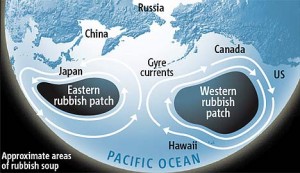Further to the article that we blogged last Monday ,it seems that some plastics marked as ‘degradable’ might not be as environmentally-friendly as consumers (or even experts) think, according to new Defra-funded research.A packaging solution to the Great Pacific Garbage soup?
The study, carried out by Loughborough University, examined the environmental effects of oxo-degradable plastics which are made from the most common types of plastic, but include small amounts of additives to make them degrade at an accelerated rate. In response to this report, the Co-operative (in the UK) is to drop oxo-degradable plastic bags.
Iain Ferguson, Environment Manager, The Co-operative Food has said that: “(subsequent to the above) We have also launched the UK’s first home-compostable carrier bag, certified by the Association for Organic Recycling (and to EN 13432), which is accepted for food waste collections by a number of local authorities.â€
Products made from compostable plastic are tested and able to bio-degrade within six months.
You can read the full March 11th article at Ready Meals Info (thanks to @packagingradar for bringing that to our attention)
There is also an interesting & related article in Packaging News today which states that:
Apparently, oxo-degradable additive producer Symphony has issued a statement that described the report as the “latest salvo in the oxo- versus hydro-degradable war” and said the allegations were familiar to firms in the sector.
Symphony also said it would be making a full response in due course, but said: “It should be obvious that plastic which self-destructs at the end of its useful life, leaving no harmful residues, is better for the environment than normal or recycled plastic, which can lie or float around for decades.”
It is also interesting that the firm also claimed that Loughborough University had not undertaken any experiments itself and that it was concerned to find that that “two of the three assessors of the report were themselves engaged in bio-based plastics, which is a totally different discipline to oxo- biodegradable”.
The plot thickens………….What do you think?
Chris Penfold
You can read the full Packaging News 12th March article by following this link: Oxo-degradable plastics article
And you can download the full DEFRA report here: Defra Report




